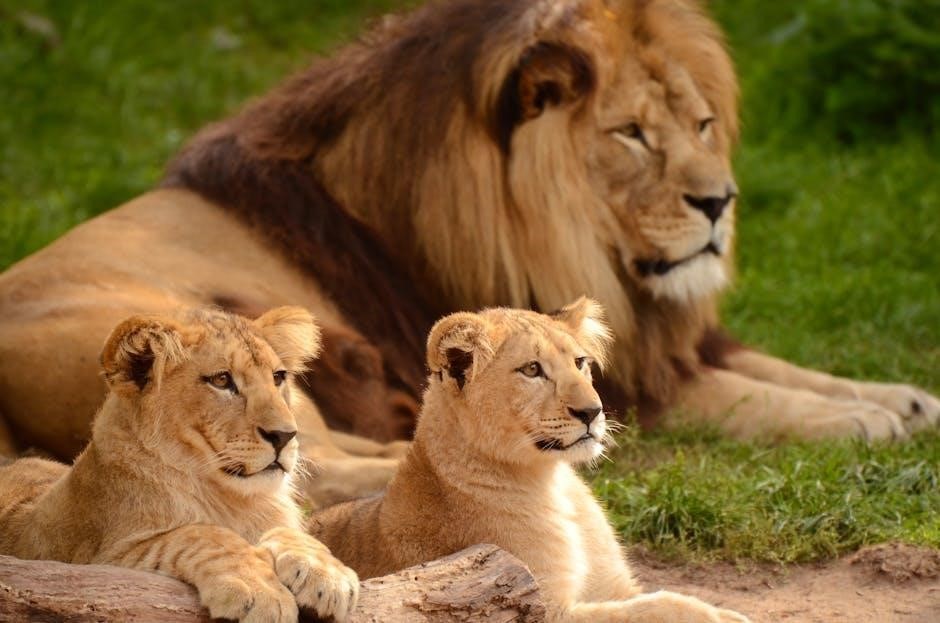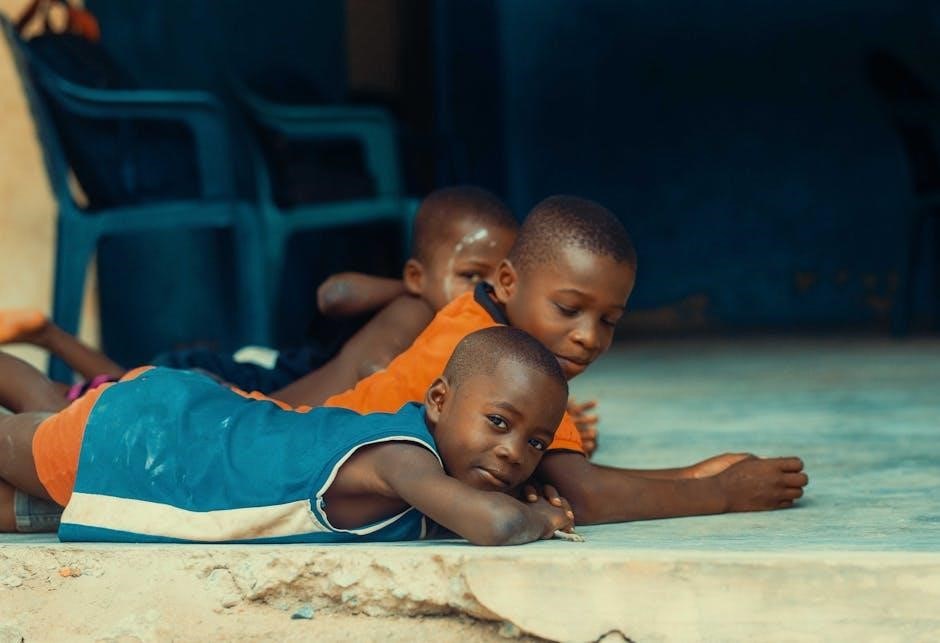Overview of The Lion King Jr. Script
The Lion King Jr. script adapts Disney’s classic tale into a junior musical, maintaining the original story’s heart while simplifying it for young performers and audiences.
The Lion King Jr. script begins with Rafiki introducing Simba, the newborn prince of the Pride Lands, to the gathered animals. Mufasa, the wise king, teaches Simba about the Circle of Life, explaining his future role as king. However, Scar, Mufasa’s jealous brother, plots against him, leading to Mufasa’s tragic death. Simba, believing himself responsible, flees, and Scar takes over. Years later, Simba returns, guided by Rafiki and childhood friend Nala, to reclaim his rightful place as king, restoring balance to the Pride Lands. The story explores themes of identity, responsibility, and redemption.
1.2 Key Themes and Messages
The Lion King Jr. explores universal themes such as the Circle of Life, responsibility, and identity. Simba’s journey highlights the importance of embracing one’s destiny and overcoming guilt. The script emphasizes redemption, forgiveness, and the balance between good and evil. Through Simba’s growth, the story teaches loyalty, friendship, and courage. These themes, woven into the narrative, inspire young performers and audiences to reflect on life’s challenges and the power of perseverance. The musical underscores the idea that everyone has a role to play in their community, fostering a sense of purpose and belonging.

Scene Breakdown in The Lion King Jr.
The script features pivotal scenes like Rafiki introducing Simba, Mufasa explaining the Circle of Life, and Scar plotting against Mufasa, driving the storyline forward.
Rafiki gathers the animals of the Pridelands to celebrate the birth of Simba, Mufasa and Sarabi’s newborn son. With traditional chants and rituals, Rafiki presents Simba as the future king, symbolizing hope and continuity. This opening scene sets the tone for the story, introducing themes of heritage and responsibility. Scar’s absence and Mufasa’s pride highlight the contrasting dynamics within the royal family, foreshadowing future conflicts. The scene is vibrant, blending African-inspired music and dance to create an engaging start to the musical.
2.2 Mufasa’s Explanation of the Circle of Life
Mufasa teaches Simba about the Circle of Life, explaining how every living thing in the Pridelands is interconnected. He emphasizes Simba’s future role as king, ensuring balance and harmony. Mufasa’s wisdom highlights the importance of responsibility and respect for nature. This pivotal moment establishes Simba’s journey and the moral foundation of the story. Scar’s lurking presence underscores the tension, as Mufasa’s lesson prepares Simba for the challenges ahead, blending duty with destiny in a powerful father-son dialogue.
2.3 Scar’s Plot Against Mufasa
Scar, fueled by jealousy and resentment, devises a plan to overthrow Mufasa and claim the throne. He manipulates Simba, exploiting his youthful curiosity and naivety, to further his own ambitions. Scar’s cunning and deceit set the stage for a tragic confrontation, as he orchestrates events to eliminate Mufasa and take control of the Pridelands. This betrayal marks a pivotal moment in the story, driving Simba’s exile and Scar’s temporary rise to power, while highlighting the destructive nature of jealousy and ambition.
Major Characters in The Lion King Jr.
The story revolves around Simba, Mufasa, and Scar, with each character playing a pivotal role in the narrative. Simba, the young prince, navigates his destiny, while Mufasa, the wise king, guides him. Scar, the cunning antagonist, drives the plot with his jealousy and ambition, creating tension and conflict that shape the characters’ journeys and the story’s outcome.
3.1 Simba: The Young Lion’s Journey

Simba, the central character, evolves from a curious and adventurous young lion to a wise king. Born to Mufasa and Sarabi, he is destined to rule the Pridelands. Mufasa teaches Simba about the Circle of Life, preparing him for his future role. However, Scar’s manipulation and the tragedy of Mufasa’s death lead Simba to flee, abandoning his responsibilities. Guided by Rafiki and lessons from his past, Simba confronts his destiny, ultimately reclaiming his rightful place as king, showcasing his growth from fear to courage and leadership.
3.2 Mufasa: The Wise and Just King
Mufasa, the king of the Pride Lands, is a symbol of wisdom and justice. He teaches Simba about the Circle of Life, emphasizing responsibility and leadership. Mufasa’s death at Scar’s hands profoundly impacts Simba, shaping his journey. Despite his tragic end, Mufasa’s legacy endures, guiding Simba to reclaim his rightful place as king. His wisdom and strength remain central to the story, inspiring Simba to embrace his destiny and restore balance to the kingdom.
3.3 Scar: The Jealous Brother
Scar, Mufasa’s scheming brother, is driven by jealousy and resentment. He resents Mufasa’s position as king and seeks to claim the throne for himself. Scar manipulates Simba, fueling his guilt and fear, while orchestrating Mufasa’s tragic death. Assuming the role of king, Scar rules with tyranny, causing suffering in the Pride Lands. His cunning and ambition ultimately lead to his downfall when Simba confronts him. Scar’s character serves as a cautionary tale about the dangers of envy and the consequences of unchecked ambition.
Musical Numbers in The Lion King Jr.

The Lion King Jr. features iconic songs like “I Just Can’t Wait to Be King,” “Be Prepared,” and “Can You Feel the Love Tonight,” which drive the story forward and showcase the characters’ emotions and motivations.
4.1 “I Just Can’t Wait to Be King”
“I Just Can’t Wait to Be King” is a lively musical number performed by Young Simba, expressing his eagerness to assume kingship and escape Mufasa’s rules. The song highlights Simba’s youthful energy and curiosity, showcasing his desire for freedom and adventure. It also underscores his impatience and naivety about the responsibilities of leadership. This upbeat track features engaging choreography and vibrant dialogue, making it a standout moment in the production while advancing Simba’s character development and setting the stage for his eventual journey.

4.2 “Be Prepared”
“Be Prepared” is a dramatic and intense musical number showcasing Scar’s cunning and ambition. The song highlights Scar’s jealousy of Mufasa and his meticulously planned plot to seize the throne. With dark, ominous tones, it reveals Scar’s manipulative nature and his rally of hyena allies to aid in his scheme. This powerful track underscores the tension and betrayal central to the story, while also providing insight into Scar’s motivations and the unfolding conflict that will alter Simba’s destiny.
4.3 “Can You Feel the Love Tonight”
“Can You Feel the Love Tonight” is a heartfelt and romantic duet between Simba and Nala, marking their reunion and blossoming feelings. The song captures the emotional depth of their bond, blending tender melodies with poignant lyrics. It serves as a pivotal moment in Simba’s journey, reminding him of his responsibilities and the love that awaits him in the Pride Lands. This iconic number balances intimacy and grandeur, highlighting the universal theme of love’s transformative power and its role in Simba’s ultimate return home.

Production Tips for The Lion King Jr.
Consider simplifying set changes, utilizing vibrant costumes, and incorporating dynamic choreography to bring the African savanna to life. Reference MTI’s Broadway Junior Collection Director’s Guide for detailed tips to enhance storytelling and ensure a captivating performance.
5.1 Stage Directions and Set Design
Stage directions should emphasize the grandeur of the African savanna, with Pride Rock as the central focal point. Utilize minimal yet versatile set pieces to transition between scenes, such as the elephant graveyard and Scar’s cave. Incorporate props like animal silhouettes and fabric backdrops to create depth. Ensure smooth scene transitions to maintain the story’s flow. Refer to MTI’s Broadway Junior Collection Director’s Guide for detailed set design ideas and stage movement tips to enhance the visual storytelling experience.
5.2 Costume Ideas for Characters
Costumes should reflect the characters’ personalities and roles. Simba can wear a lion cub onesie with a subtle mane headpiece, transitioning to a more regal look as he matures. Mufasa’s costume should feature a majestic mane and earthy tones to symbolize wisdom. Scar’s attire should be darker, with tattered elements to convey jealousy. Rafiki can wear traditional tribal clothing with face paint, while Timon and Pumbaa should have fun, colorful outfits. Use creative materials like foam, fabric, and paint to bring the African savanna’s animal kingdom to life on stage.
The Lion King Jr. captivates audiences with its timeless story of growth, loyalty, and destiny, adapted perfectly for young performers and junior audiences;
6.1 Summary of Key Elements
The Lion King Jr. script masterfully adapts Disney’s beloved tale, blending vibrant characters, memorable songs, and timeless themes into a captivating junior musical. It follows Simba’s journey from a curious cub to a wise king, exploring themes of identity, responsibility, and the circle of life. The story is enriched by iconic characters like Mufasa, Scar, and Rafiki, whose roles highlight leadership, betrayal, and wisdom. With its simplified yet engaging narrative, the script is designed for young performers, offering a perfect balance of drama, music, and spectacle that resonates with audiences of all ages. The musical numbers and production tips further enhance its appeal, making it a rewarding experience for both participants and spectators. Ultimately, The Lion King Jr. delivers a powerful and heartwarming story that celebrates growth, loyalty, and the enduring spirit of African culture. Its universal themes and accessible format ensure its continued popularity in educational and theatrical settings. The script’s ability to inspire young actors and entertain diverse audiences solidifies its place as a cherished junior adaptation of a classic tale. By focusing on essential elements, The Lion King Jr. provides a comprehensive yet concise theatrical experience that honors the original while catering to a new generation of performers and viewers. Its success lies in its ability to balance simplicity with depth, ensuring that the core message of Disney’s The Lion King remains intact and impactful for junior productions. This adaptation not only preserves the magic of the original but also introduces it to a younger audience, fostering a love for theater and storytelling. The script’s structure, with its clear scenes and songs, makes it an ideal choice for schools and youth theaters aiming to produce a high-quality musical. In summary, The Lion King Jr. is a well-crafted adaptation that remains true to the spirit of the original while being tailored for young performers, ensuring its legacy endures through new generations. Its thoughtful design and engaging content make it a valuable resource for educational and theatrical purposes. The Lion King Jr. continues to enchant audiences with its universal themes and memorable performances, proving why it remains a favorite among junior theater productions. Its ability to adapt while retaining the heart of the story ensures its relevance and appeal in contemporary theater education. By blending education with entertainment, The Lion King Jr. offers a unique opportunity for young actors to grow artistically while bringing a beloved story to life. The script’s accessibility and depth make it an excellent choice for introducing students to the world of musical theater. In conclusion, The Lion King Jr. is a testament to the power of storytelling, providing a enriching experience for both performers and audiences alike. Its enduring appeal lies in its ability to inspire and educate through the magic of theater. The Lion King Jr. is not just a junior adaptation; it is a celebration of the original story’s timeless themes and universal appeal. By simplifying complex elements while maintaining the narrative’s integrity, the script ensures that the essence of The Lion King is preserved for a younger generation; This approach not only honors the original but also makes it accessible to new audiences, ensuring the story’s continued relevance in the world of theater. The Lion King Jr. serves as a bridge between the classic tale and contemporary youth theater, fostering a deeper appreciation for both the story and the art of performance. Its success is a reflection of the original’s enduring legacy and the adaptability of its themes for modern audiences. In essence, The Lion King Jr. is a celebration of storytelling, education, and the transformative power of theater, making it a vital part of junior theater productions worldwide. The script’s thoughtful adaptation and engaging content ensure that it remains a cherished resource for educators and performers alike, inspiring creativity and confidence in young actors. By balancing simplicity with depth, The Lion King Jr. offers a theatrical experience that is both enjoyable and enriching, leaving a lasting impact on all involved. The Lion King Jr. is a shining example of how classic stories can be reimagined for new generations, maintaining their essence while adapting to the needs of young performers and audiences. Its ability to blend entertainment with education makes it a cornerstone of junior theater productions, ensuring that the magic of The Lion King endures for years to come. The script’s accessibility, coupled with its rich themes and memorable characters, makes it an invaluable tool for introducing young people to the world of theater. In doing so, The Lion King Jr. not only preserves the legacy of the original but also nurtures a new generation of theater enthusiasts and performers. Its impact extends beyond the stage, fostering a lifelong appreciation for the arts in both participants and audiences. The Lion King Jr. is a testament to the power of adaptation and the enduring appeal of a well-crafted story. By simplifying the original while retaining its heart, the script ensures that the story remains relevant and engaging for contemporary junior productions. Its thoughtful design and educational value make it a preferred choice for schools and youth theaters seeking to produce a high-quality musical. In summary, The Lion King Jr. is a masterful adaptation that honors the original while catering to the needs of young performers and audiences. Its ability to inspire and educate through the magic of theater ensures its continued popularity and relevance in the world of junior musical productions. The script’s success lies in its balance of simplicity and depth, making it a valuable resource for fostering creativity and confidence in young actors. By preserving the essence of The Lion King while adapting it for a new generation, The Lion King Jr. ensures that the story’s timeless themes and universal appeal endure for years to come. The script’s accessibility and educational value make it an excellent choice for introducing students to the world of musical theater, leaving a lasting impact on both performers and audiences alike. In conclusion, The Lion King Jr. is a celebration of storytelling, education, and the transformative power of theater, solidifying its place as a cherished resource in junior theater productions worldwide. The Lion King Jr. is not just an adaptation; it is a bridge between the classic tale and contemporary youth theater, fostering a deeper appreciation for both the story and the art of performance. Its enduring appeal lies in its ability to inspire and educate through the magic of theater, ensuring that the legacy of The Lion King continues to thrive in the hearts of new generations. The script’s thoughtful design and engaging content make it an invaluable tool for educators and performers alike, nurturing a love for theater and storytelling in young people. By balancing simplicity with depth, The Lion King Jr. offers a theatrical experience that is both enjoyable and enriching, leaving a lasting impact on all involved. The Lion King Jr. is a shining example of how classic stories can be reimagined for new generations, maintaining their essence while adapting to the needs of young performers and audiences. Its ability to blend entertainment with education makes it a cornerstone of junior theater productions, ensuring that the magic of The Lion King endures for years to come. The script’s accessibility, coupled with its rich themes and memorable characters, makes it an invaluable tool for introducing young people to the world of theater. In doing so, The Lion King Jr. not only preserves the legacy of the original but also nurtures a new generation of theater enthusiasts and performers. Its impact extends beyond the stage, fostering a lifelong appreciation for the arts in both participants and audiences. The Lion King Jr. is a testament to the power of adaptation and the enduring appeal of a well-crafted story. By simplifying the original while retaining its heart, the script ensures that the story remains relevant and engaging for contemporary junior productions. Its thoughtful design and educational value make it a preferred choice for schools and youth theaters seeking to produce a high-quality musical. In summary, The Lion King Jr. is a masterful adaptation that honors the original while catering to the needs of young performers and audiences. Its ability to inspire and educate through the magic of theater ensures its continued popularity and relevance in the world of junior musical productions. The script’s success lies in its balance of simplicity and depth, making it a valuable resource for fostering creativity and confidence in young actors. By preserving the essence of The Lion King while adapting it for a new generation, The Lion King Jr. ensures that the story’s timeless themes and universal appeal endure for years to come. The script’s accessibility and educational
6.2 Final Thoughts on the Script
The Lion King Jr. script is a masterful adaptation that preserves the essence of the original story while being tailored for young performers. It strikes a perfect balance between simplicity and depth, making it accessible and engaging for both participants and audiences. The script’s universal themes of identity, responsibility, and the circle of life resonate deeply, while its musical numbers enhance the storytelling. With its educational value and theatrical appeal, The Lion King Jr. is a valuable resource for fostering creativity and confidence in young actors. It remains a timeless and inspiring choice for junior productions.




About the author